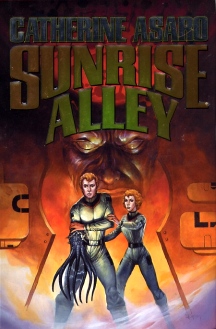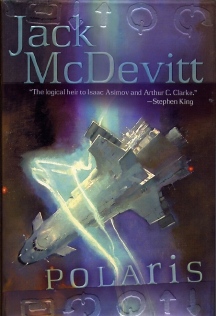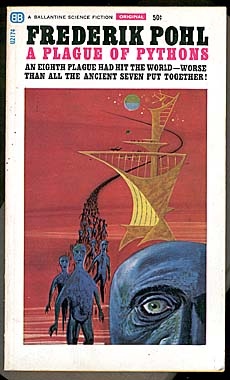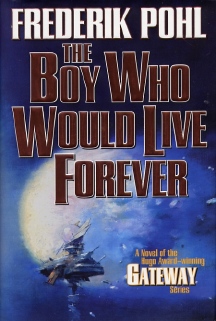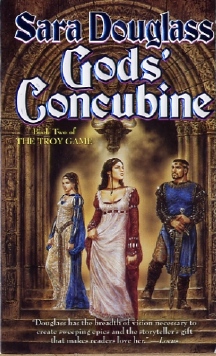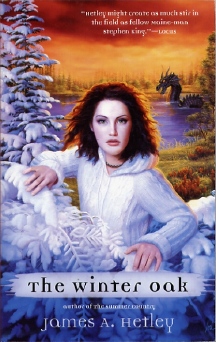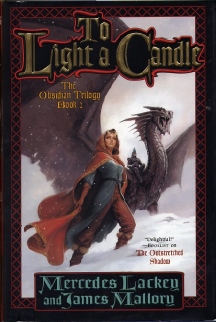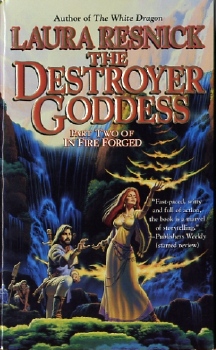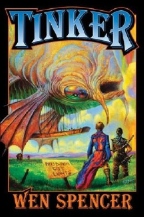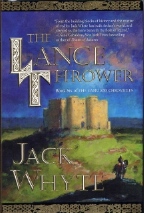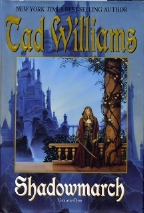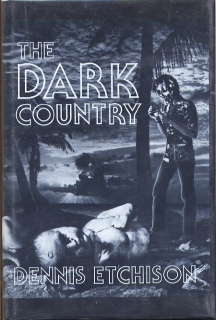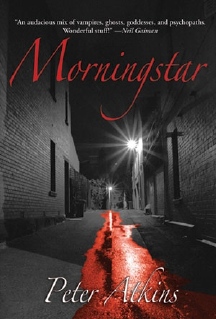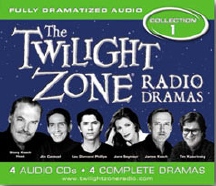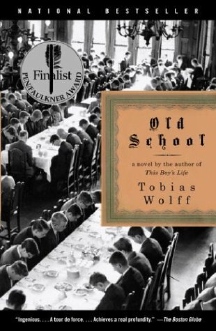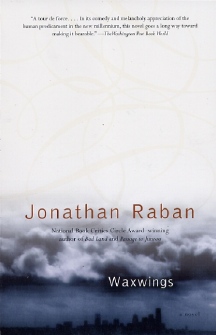|
|
|
This Just In...News from the Agony Column
|
10-22-04: Catherine Asaro in 'Sunrise Alley', Jack McDevitt's 'Polaris' and Frederick Pohl's 'The Boy Who Would Live Forever' |
|||||||||||||
The
Science Fiction Side of the Street
Catherine Asaro has a lot to recommend her. She won a Nebula Award for 'The Quantum Rose'. She also wins some acclaim from Romantic Times, putting her fiction in direct competition with the fantasy that also is eking out a niche in the lucrative world of genre-romance. Of course, she's written fantasies as well, and near-future techno-thrillers. Now I've got to admit that when I tell people that I read science fiction, I suspect the book cover image that arises in their brain is not unlike the one that graces her latest science fiction novel, 'Sunrise Alley' (Baen Books, August 2004, $24.00). But that Alien-esque, Cthulhu-like appendage on the otherwise handsome-type guy is pretty damn cool. And the plot sounds pretty intriguing as well, though you can see Romantic Times looking over your shoulder as you read about it. Look, see? I'm all better now! No froth round the mouth, no images of BART or weird punk-rock album covers. Better! Happy! Shiny! Shiny is the applicable word as far as 'Sunrise Alley' goes. Shiny because when Samantha Bryton, research scientist, finds a shipwrecked survivor, nearly drowned, on the beach near her home, it turns out that he's dead. Well, not dead, but technically dead. Well, not technically dead, so much as resurrected via illegal AI technology. Maybe that hand-thing clues her in. I can imagine it would be a delicate topic. "Left handed, eh? Oh, I'm sorry --" Turns out the dead guy, Turner Pascal is an experiment by a Charon. You guessed it; the fact that he takes the name of the ferryman in Hades is not a sign of his beneficent intentions. In fact, Charon is the kind of criminal who would find a kindred soul in Viktor Frankenstein, and he's in hot pursuit of his escaped property. Turns out that Turner no longer has a human brain in his head; it's an AI uploaded with his personality and easily enslaved to Charon, assuming that Charon can get his hands (or maybe they're not hands) on Turner. He and Samantha find themselves on the run from the law and the criminals. They have only one place to turn -- Sunrise Alley, an underground railroad for rogue AI's. And Sunrise Alley's agenda may not be beneficial to anyone involved. This book does not appear to be part of any series, and it does offer what looks to be a pretty damn exciting story in a terse 307-page package. Behind a cover out of the sixties or seventies, Baen is offering readers a nice little rip-roaring romp that should distract their tiny brains from concerns such as the deficit, the various wars, hunger, poverty, whatever. Huh? Wait, I just want to find out what happens to this cyborg honey.
Here's where things get interesting. Sixty years later, the incident still has a hold on the popular imagination. Now, with books and articles planned, antiquities dealer Alex Benedict has laid his hands on the objects owned by the doomed ship's passengers. Until they're blown up. Now the mystery of what happened -- and is happening -- starts to get personal. McDevitt is a pretty interesting author, who has been offering a number of books that are pleasantly non-serial, stand-alone works that poke about in the odder corners of the science fictional universe. He mentions a couple of intriguing sources for this novel; 'To Seek Out New Life' by Athena Andreadis (Three Rivers Press, 1998) and Michael Shara's article 'When Stars Collide' (Scientific American, November 2002). Readers looking for a little science in their science fiction, and the kind of mystery-orientation that Asimov brought the genre in his best works might want to pick this one up.
But he's back and it sounds as if he's in fine form. As the novel starts, the Heechee have all moved to the Galaxy's core, the better to avoid the Kugel, an alien race that wants to destroy everything that's not Kugel. Humanity is using the remnants of the Heechee's gateway system to explore the galaxy, and avoid the Kugel. But hate-filled human may prove as dangerous to humanity as the Kugel. The publicity materials that accompany this novel go a rather interesting route of including a series of bullet-pointed subjects that the novel purportedly speaks to. Not that I doubt that it does. Pohl has always been a bit of a social commentator. But in case you might miss it them, here are the highlights, bullet-pointed to complement your ever-shrinking attention span:s
Seems like a pretty full house to me. Toss in the
meaning of life, and heck, who needs a spiritual advisor? You've got
Frederick Pohl.
Even better,
you'll get much more than a soupcon of adventure with your social
commentary; you'll get boy-meets-girl-and-travels-the-galaxy. This
is Old School science
fiction, the kind we all cut our teeth on. And continue to cut our
teeth on. |
|
10-21-04: Fantasy Meltdown: Sara Douglass/'Gods' Concubine', Laura Resnick/'The Destroyer Goddess, James A. Hetley/'The Winter Oak', Mercedes Lackey/'To Light A Candle', Jack Whyte/'The Lance Thrower', and Tad Williams/'Shadowmarch' |
|||||||||||||||||||||||||||||||||||
If
You Print It, They Will Buy -- or Will They?
So I pretty much approve of all this fluffy fantasy that gets fire-hosed out at an unsuspecting readership. But let's Get Real. Booksellers and publishers -- and writers and editors -- tend to assert that fantasy outsells science fiction and horror. Perhaps that's because there's about ten times more fantasy printed than there is horror; with SF the factor might be five or so. And publishers typically count sales to bookstores, not readers. And bookstores stock what publishers sell them. It's not a vicious circle. It's a very friendly circle. It's a circle jerk. One hand, uh, feeds the other. I'm not sure if anyone is actually tracking sales to readers, or how they're doing so. In the latest 'Holt Uncensored', writer Dick Lupoff tells Pat Holt in a letter about his experience writing fantasy: "At a fantasy-and-science-fiction conference some years ago, a number of editors and publishers were kicking this matter around during a penal discussion -- whoops, I meant to say, a panel discussion. They agreed that certain words were certain to sell fantasy novels. "God" or "Gods" was one, "Unicorn" was always popular, and there was always that good old standby, "Naked."
So on one hand, I approve of all the fluffy fantasy out there, hell, Just Look Around. Our Modern World is particularly worthy of escape. On the other hand, I'd like to suggest that a) the current flood of fantasy is going to wind up where every other flood wound up -- in piles of remaindered titles and ghetto-ized once the boom busts and b) fantasy currently "sells" so well because fantasy is currently published so well. So when we talk about fantasy overwhelming the bookshelves and being a big seller, let's remember that publishers and booksellers have to get it into the hands of the BART ridership. Well, enough philosophizing. No, wait, not yet. There's one more factor one has to mention here. And that's the Harlequin Effect. That is, the old Harlequin romances that used to occupy a pretty big chunk of the marketplace now seem as clunky as they always in fact were. I know it's going to make heads spin round and shoot out split-pea soup, but face it guys: a big chunk of the fantasy sales is now to romance readers. I mean, the blurbs on the back of the books are from Romance times, and if you can't take note of covers that look more like a Lands' End [ 1 ] catalogue than The Lord of the Rings, then you got yourself some blinders that you need to patent and sell the Leaders of Our Country. Fantasy fiction is now dominated by Lifetime literature. Hey, that's OK! I'll read Lifetime lit (Damn, my own head is spinning!) if it's well-enough written. (Watch out for that pea soup --oops, sorry.) Damn, I philosophized my own head right off my shoulders. Best to leave the realm of the vague generalizations and get right down to specifics, that is, to take a peek at the current crop of fantasy fiction and fearlessly fling it into high prejudicial categories. 1: Bart Books: Read 'em on the train. When you're done, leave 'em on the train. 2: Couch Comforters: Read 'em while someone you love watches something you hate. When you're done, give them to someone you love while you watch something they hate. Or hand 'em off to your book-reading best-friend. 3: Read-'em-and-keep: Hardcover and paperback hand-Me-Downs you can loan to your friends but will demand to be returned. Realize that what books get into which category is a function not only of perceived prose and novelistic quality, but also of format and price. I mean, you're less likely to leave behind a hardcover novel on a train than a mass-market paperback. And you might be less inclined to buy a hardcover novel that is a Bart Book than the paperback version. Also, if you're getting to the point where you would rather read a hardcover book simply because it's easier to read, and you've got the disposable income, then hell, go ahead and buy that hardcover Bart book, enjoy the hell out of it and take it to Logos so some less-fortunate soul with bad eyes and bad finances can have a go. So let's go!
Sara Douglass brings some pretty impressive credits to the party [ 2 ]. She's a two -time recipient of the Aurealis Award (An Australian SF&F award), she has a PhD in 16th century English history, and her title 'The Wayfarer Redemption' was a Booksense 76 pick for March/April 2001. She's a part of the Tor Books Women in Fantasy program. Now that's a smart marketing move. She's got a website from which she sells not only her books, but vintage linens. The mind boggles. The book has a Glossary that's little over three pages. Now, since it's a mass-market paperback, the temptation is to call this a Bart Book, and I'm going with that impression. But I have to say, in that case, some pretty damn interesting titles will get left on the train. And to be quite honest, the series seems complex enough that you might want to hang on to this, so that when the next volume arrives, you'll be able to refer to this one.
This book's a Trade Paperback original, and I guess the Lands' End sweater is explained by the world-jumping theme. It tops out at 295 pages, and the prose on the first page looks quite entertaining. The two-worlds theme leavens the potential smarminess of the Generic Celtic Fantasy look, and one might hope that it could be worthy of loaning to someone you'd want to see again. Given the format and the leavening factor, I'm calling this a Couch Comforter.
Now, before you write this off, note that Laura Resnick is a Campbell award winning writer; others who won this include Cory Doctorow and another writer I'll cover below, Wen Spencer. So if this is comfort reading, it's probably well-written comfort reading. You've got sea-clans (not clams), Waterlords, rivalries, tyrannies and a prophesied Firebringer. You've got only a one-page glossary, and three pages advertising the launch of Tor's Paranormal Romance Line. Oh my. The book of a Lifetime, so to speak. And certainly a book to read, cherish, and ensure that you don’t get so drawn in to that you miss your train stop. Do I have to say where this one goes? Take A Train.
Now the next book is one of those that whether I want to admit it or not -- gets a lot of mileage out of the cover by Les Edwards, AKA Edward Miller, the cover artist of choice for both the Pan Macmillan China Miéville books and the PS Publishing line. Look upon his work and despair. It's gloriously beautiful, a landscape I want to be in myself, perhaps even reading a book like 'The Lance Thrower' by Jack Whyte. (Forge/Tor Hardcover, October 6, 2004; $27.95). I'd be very, very tempted to jump right in here, but this is book SIX of The Camulod Chronicles. So, right off the bat, you've got yet another Old-English derivation of Camelot. Heck, I can hear Richard Harris now. I loved that movie when I was a kid, and I've always been sort of a sucker for this sort of thing. Obviously, you're going to have to rewind to check out his earlier titles, but wisdom suggests that they're all available. I like the vibe I get from this book; it seems a bit on the quiet and literary side. These might be Couch Comforters. And with a cover like that, hell, even though you can easily do a cheap "the spear catcher" joke (twice!), this is something that you can leave on the coffee table with pride. It just screams quality. The vitals: type medium (maybe 10 point?), 527 pages, no dramatis personae, no glossary, no map. That's pretty damn literary for this genre. Then finally -- and I know you've been waiting for this -- it's Tad Williams' return to High Fantasy Shadowmarch Volume One (DAW Hardcover, November 2004; 25.95). What you've got here is a marketing juggernaut with not one, but two, count 'em two gorgeous dust jackets by fantasy-art superstar Michael Whelan. Note that Whelan did the art for the first, original, 'Gungslinger' fantasy novel by Stephen King. Yes, you'll find all sorts of supposed King-fans on the net swearing their allegiance to that series when they never bothered to get that original hardcover. Whatever. Cast them aside, accept no imitations. Here is the new fantasy novel by Tad Williams, and it's got monstrous critters coming out of the Shadowline and thus, my complete attention. The Shadowline has long marked the boundary between men and the monstrous Qar. Hell, those Qar are so monstrous they don't even know that a "Q" is always followed by a "U". Now they're moving that line, and what's worse, human evils are on the move as well. The inexperienced heirs of King Olin are on the spot, trying to keep Southmarch from becoming Shadowmarch. Williams is a big old brand name and you might be well advised to buy two copies of these novels just to be sure the alternate dust jackets don't get outrageously overpriced on E-Bay. You know of course that the E in E-Bay stands for evil, right? That they're moving the line over on you, that you have to defend, etc, etc? Get out your sword! Get out your credit card! This one, both versions, is a read-em and keeper.
[1] From Terry D'Auray, Proofreader: "Lands' End has the apostrophe in the wrong place - at the end, not between the "d" and "s" where it belongs. It has always been so, it has not gone unnoticed, and they're damn proud of it and will never change." [Return.] [2]Note that "party" is not used as a verb here. [Return.] |
|
10-20-04: Ado Due for a Big Bookstack |
|||
Scoping
the Backlog
So without further ado, from the top down, the list: Sara Douglass, Gods' Concubine (Book Two of the Troy Game) Laura Resnick, The Destroyer Goddess (Book Two of In Fire Forged) Jeff VanderMeer, Veniss Underground (Pan McMillan MMPB) James A Hetley, The Winter Oak Matt Hughes, Black Brillion Jonathan Lethem, Amnesia Moon David Mitchell, Cloud Atlas Jack McDevitt, Polaris Jack Whyte, The Lance Thrower (sequel to 'The Spear Catcher'?*) Tad Williams, Shadowmarch Iain Banks, A Song of Stone Catherine Asaro, Sunrise Alley Iain M. Banks, The Algebraist (to be reviewed tomorrow) John Connolly, Nocturnes Lisa Tuttle, My Death (two paperback, one hardcover) Robert A. Heinlein, Glory Road Gary Gibson, Angel Stations Wen Spencer, Tinker Mercedes Lackey and James Mallory, To Light a Candle Frederick Pohl, The Boy Who Would Live Forever (Heechee series) [Ado deleted due to time considerations.*] *Well some ado. After all, isn't that what I'm not paid to do? Really that makes sense. Or maybe, if it makes sense, you (I) need to worry. |
|
10-19-04: Welcome to the Rolling Darkness Review |
||||||||||||||||
| A
Conversation With Dennis Etchison, Glen Hirshberg and Peter Atkins
It's been just about 24 hours since I returned home from my interview with The Rolling Darkness Review; that is Glen Hirshberg, Dennis Etchison and Peter Atkins. I'm making this update late or early, depending on how you look at it, because I want to urge my readers who still have the chance to get out and see these three writers. To help you decide in the positive, I've got our hour of conversation up in MP3 and RealAudio format.
We covered the basics of horror, from "Why do we like to be frightened?" to a talk about the power of the small press. Peter Atkins made a really astute observation, to wit, that what we call the "small press" these days is doing the same numbers that the major houses themselves once did. The imprints that have all been beamed up into the bowels of the mega-corporations that run the planet were themselves once much like Night Shade, Cemetery Dance and Subterranean Press. Etchison himself practically made his name due to the efforts of Scream/Press when they published his collection of short stories, 'The Dark Country' -- a collection he himself had been trying to get published for 13 years. Once published, it won awards and brought Etchison into the company of writers like Straub and King. But much more importantly, after the interview, they all told me where we can now get their books. Etchison and Atkins both have volumes available from a new small press, infrapress, which specializes in works that are "under the radar", infra being the Greek for under -- get it? OK! Look for one my favorite John Shirley novels coming soon as well.
Here's a direct link to infrapress, where you can purchase Etchison's collection 'Talking in the Dark'. If you've never read Etchison, this is the place to start, but I'll warn you. You're going to buy this book and enjoy the stories so much that you'll be running searches for the Scream/Press editions before you finish this one, which does have material that is not in the Scream/Press editions as well.
thedarkcountry@aol.com The CD is signed, limited and well worth finding. Etchison is also working on audio versions of every classic episode of Rod Serling's 'The Twilight Zone'. The radio dramatizations feature Stacy Keach doing the Rod Serling voice and many major TV and movie stars. Readers can purchase CD collections of 4 episodes -- one per CD, from the Twilight Zone Radio website. Meanwhile , infrapress is also publishing Peter Atkins' novels. Already available is 'Morningstar', Atkins' visionary novel of vampires in San Francisco, filtered through a poetic serial killer POV that's powerful and unique. Coming soon is Atkins' novel 'Big Thunder', also from Infrapress. And finally, readers can go to Glen Hirshberg's website, glenhirshberg.com to get a gander at a sample chapter of his novel 'The Snowman's Children' -- which I'm currently reading and enjoying greatly. Just don't expect anything less than a finely written, gripping piece of literature. He's also got a story titled 'Like a Lily in a Flood' in the upcoming huge issue number 50 of Cemetery Dance. But most importantly, readers can get a bit of all this live; just attend the Rolling Darkness Review, and you'll be able to say that you were there when..."when" in this case being, they first got the darkness rolling. 10/20 - Dark Carnival, Berkeley, CA 10/21 - Borderlands, San Francisco, CA 10/22 - Mysterious Galaxy, San Diego, CA 10/23 - Mystery and Imagination, Glendale, CA |
||||||||||||||||
|
10-19-04: Tobias Wolff Returns to the Old School |
|||
| From
Memoir to Fiction by Serena Trowbridge
'Old School' is set in 1960 at a New England boarding school, described as “the fictionalised leg of a journey that started with This Boy’s Life”. The novel is one of both humour and pathos, satirising the life at school with a look at aspiring young writers among the students and looking at moral principles, aspirations and the transition to adulthood along the way. The ambition which drives the central character forces him into a dilemma which colours his life more than he had ever expected. This novel has delighted critics so far and follows in a tradition of classic school-days novels, from 'Hard Times' to 'The Secret History'. Novelists writing about the power of literature, aspiring writers and their craft are always interesting, and this promises to be a treat. |
|
10-18-04: Take Flight on Jonathan Raban's 'Waxwings' |
|||
Life Before the Dot Bomb
The end result is that those of us who were interested not just in the speculation, but the ideas themselves now have a wider palette of fiction from which to choose. Jonathan Franzen's 'The Corrections' concerns itself with brain chemistry in a way that Philip K. Dick would admire. And now it appears that Jonathan Raban's 'Waxwings' (Vintage / Random House Trade Papberback Reprint, September 28, 2004, $13.00), another turn-of-the-twenty-first century novel, wants to talk about the intrusion of the virtual upon the real. That's another favorite of Philip K. Dick's. Of course, thematically, Dick proved to be one of the great prognosticators of science fiction; but then, the world itself seemed to take Dick's fiction to heart, as well. 'Waxwings' is set in Seattle in 1999, in the middle of the Dot-com business explosion. Raban, himself an expatriate Englishman who has been living in Seattle since 1990, here concerns himself with the aliens among us. Tom Janeway is a Hungarian-born Englishman who earns a living commenting on American mores for NPR. (Proof indeed the novel is science fiction!) Chick is an illegal alien from China who is hustling and bustling his way to the top. Through a series of humorously surreal events they manage to meet. Raban brings a sort of quiet, British amusement to his prose, as he describes rioting anarchists, vanishing children, and even an Al Qaeda operative. He and his characters are just outside the society they live within, the worlds they move through, to see the absurdity that we accept as everyday reality. His prose is quickly read but not slick. Rather, he writes in the careful way of today's British writers, offering a mixture of details that he balances between being tragic and comic. Then, of course, there's the science fiction element; someone who makes a living doing commentary for NPR. As an occasional contributor to NPR content, I can assure readers that it's not an appropriate career choice for your children. If they seem inclined to choose this career, suggest something more realistic, like video game testing. If that falls through, they'll at least have the skills for another big-bucks occupation, doing Defender-style missile shooting for the Star Wars defense. Assuming that this does not remain in the realm of science fiction, of course. |
